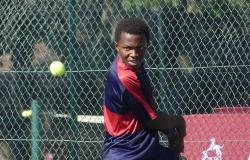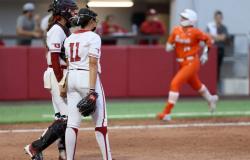By: Chris Harlan
Wednesday, April 24, 2024 | 7:03 PM
Christopher Horner | TribLive
PIAA executive director Bob Lombardi at the PIAA basketball state championships on Thursday, March 23, 2023 at the Giant Center in Hershey.
If the PIAA competitive-balance rule were nullified, “it would probably cause chaos,” the PIAA’s top administrator said Wednesday during testimony in a Beaver County courtroom.
Schools are already planning homecoming celebrations and other special nights based on fall sports schedules, said PIAA executive director Bob Lombardi, who insisted that those would need to be changed if teams switched classifications now.
This was the second day of testimony linked to a lawsuit brought by the Aliquippa School District, which is seeking a preliminary injunction to prevent the PIAA from moving its football team into a higher classification for the next two seasons.
If an injunction left the PIAA rule in place but allowed Aliquippa to remain in Class 4A, “every one of those other schools that have gone up would probably take us to court,” Lombardi added.
His answers brought a quick rebuke from Common Pleas Judge James Ross, who said they seemed like an attempt to influence his eventual decision. PIAA attorney Dana Chilson argued that granting the preliminary injunction would cause the greater harm, a position Aliquippa attorney Tina Miller strongly rejected.
The hearing will need a third day of testimony, but that day won’t come for a few weeks. The hearing was paused with Lombardi on the witness stand and will resume on May 17.
The judge tried to find an earlier date that worked for both sides, but could not because of schedule conflicts. Once the testimony is complete, the judge said, his ruling could come in late May or early June, at the latest.
Miller told the court she was concerned that the PIAA might attempt to say it’s too late to change anything, even if Aliquippa does get its injunction.
Lombardi, the PIAA’s first witness, spent much of his testimony discussing the creation and evolution of the competitive-balance rule. Chilson led him through months’ worth of minutes from various PIAA meetings to say the rule was discussed both before and after its adoption in 2018.
Lombardi said ideas used in the rule were largely based on formulas created by other states and through discussions the PIAA executive staff had with counterparts, some while at National Federation of State High School Associations meetings.
“I interviewed those people extensively … and saw what those states were doing,” Lombardi said.
Miller, as Aliquippa’s attorney, questioned whether the rule and subsequent changes were actually ill-conceived. While questioning Lombardi, she focused on the PIAA’s decision to eliminate health and safety as a ground for an appeal.
Two orthopedic surgeons testified Tuesday that they saw health risks for a football team playing in a higher classification against opponents with many more students.
Lombardi disagreed.
“I have not seen that in my years of experience,” he said. “That doesn’t mean I’m not concerned about it.”
The two Allegheny Health Network surgeons, Drs. Patrick DeMeo and Dr. Stephen Hribar, said PIAA decisions should be based on research and data.
Lombardi said the PIAA did not conduct any research or consult any studies before editing the formula. Instead, Lombardi said the decision was based on a belief that a dominant team in a lower classification could play in a higher class without added risk.
Quips football coach Mike Warfield testified Tuesday that he believed the PIAA had rewritten its rule to specifically target Aliquippa after it avoided promotion in 2022.
Asked if that were true, Lombardi said: “No.”
Going back to 2018, Lombardi said the PIAA was attempting to ease concerns from member schools and state legislators when it first created the competitive-balance rule. He said the formula was influenced by ideas from various states, including Indiana, Oregon, Ohio and Tennessee.
Miller questioned Lombardi on why the PIAA formula included transfers when most, if not all, of those states did not.
She said one state also included a school’s socio-economic status as a mitigating factor. Asked if the PIAA considered incorporating a socio-economic factor, since it didn’t appear in any minutes, Lombardi said: “The board considered A to Z … but it didn’t carry the day.”
Lombardi noted that the PIAA board almost eliminated the transfer part from the formula two years ago, but the move failed on a third vote.
There were many points of contention between Aliquippa and the PIAA about the changing versions of the rule.
Aliquippa argued that the original language did not say teams already voluntarily playing in a higher classification would be forced up from that higher class, not their true enrollment class. The Quips in 2018 qualified for Class A, but were moved up from 3A to 4A.
“I think when we say ‘standard procedure,’ there’s an inference,” Lombardi said.
Aliquippa’s attorney questioned why the threshold for football transfers was reduced from five to three before the rule took effect.
Lombardi said member schools at the time were concerned that the original number was too high, leading Miller to question who those schools were. Lombardi said he didn’t recall.
There was also extensive discussion about the PIAA definition of a transfer, with disagreement over whether the competitive-balance rule should consider if a player contributed to a team’s success on the field.
Lombardi was being questioned by Miller when the court reached the end of its day. Lombardi will continue his testimony when the hearing resumes.
The hearing started Wednesday morning with Aliquippa’s final two witnesses, athletic director Jennifer Damico and superintendent Phillip Woods. They discussed the financial and logistical hardship the football team would face in Class 5A.
The two administrators also described a student body that’s always changing because of a community they described as transient. Their point was that since the PIAA rule targets teams that have state playoff success and add transfers, it unfairly impacts a lower-income community like theirs.
“When you face a financial hardship, you move to where you can afford to live,” said Woods, an Aliquippa native who returned to his alma mater as superintendent three years ago.
Chris Harlan is a TribLive reporter covering sports. He joined the Trib in 2009 after seven years as a reporter at the Beaver County Times. He can be reached at [email protected].
Tag: Aliquippa
Tags: Aliquippa injunction hearing PIAA takes #3week break executive director testifying
-





